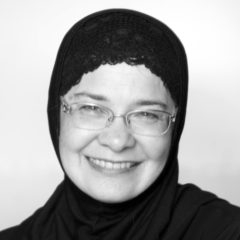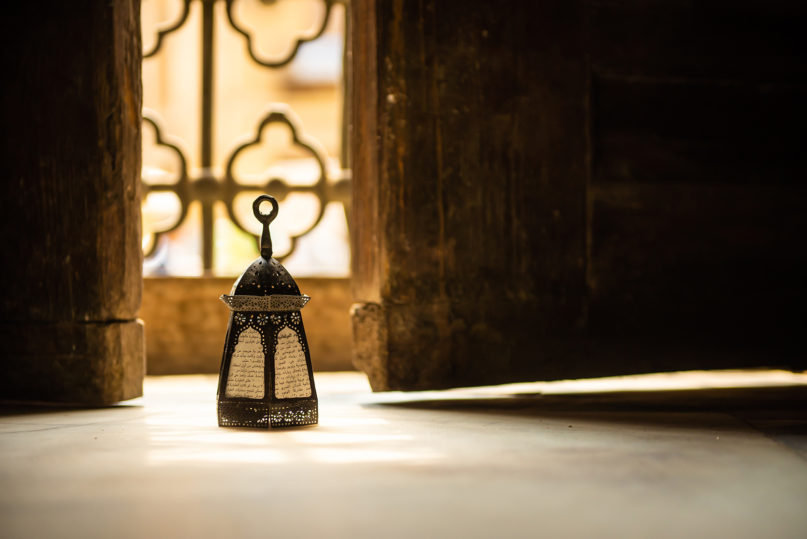(RNS) — On the first night of Ramadan this year I visited my local mosque’s Facebook page and watched a 15-minute sermon by the imam.
He scanned the room as he spoke, looking right and left, as though engaging a real audience, although there was none. He was addressing an empty prayer hall as a few dust motes illuminated by the camera lights flitted by.
He looked directly at the camera and reassured his online audience that everything would be alright this year, even though the coronavirus pandemic has shuttered mosques, halting congregational prayer that is normally said there, and social gatherings, including the communal dinners that end many Ramadan days, are risky and ill-advised.
This is not only awkward and lonely; it feels un-Islamic. When Muslims stand for prayer we deliberately leave no space between each other. We also tend to shake hands, hug and kiss a lot. We call each other brother and sister, and we take that idea seriously. Thanks to COVID-19, we’ve had to abandon these habits. Our detachment is our defense now.
RELATED: Women in Muslim countries prepare for ‘least, most’ Ramadan
On April 23, the day before Ramadan began, the Assembly of Muslim Jurists of America, a respected and authoritative group of scholars, made a declaration about taraweeh, the special evening prayers said by the congregation during Ramadan. Acknowledging that taraweeh is not possible because of the risk of infection, their statement urged the Muslim community to take a positive view. They wrote:
(We should be) striving to make the performance of salat (prayer) in and of itself our ultimate goal, with our ambitions directed toward it and away from that which can render our intentions impure, such as seeking to socialize with others in the congregation, which tends to occur in congregational Taraweeh prayers in the mosque.
This admonition appeals to me. I’m an introvert, and have become much more so in the last few years. The evening crowds of hundreds in the hallways of the mosque, people jostling for a good spot in the prayer hall, while unattended children run and scream with excitement, the rush for late-evening tea and snacks — at one time I embraced the chaos, but now it overwhelms me.
This year, on the first night of Ramadan, my husband and I took our places to pray taraweeh at home alone for the first time this year. He was to lead the prayer and had been prepping during the day, brushing up on Quranic verses, selecting ones that seemed especially relevant, and practicing recitation.
I joked that our house was now a mosque and he’d better study up if he was to be the imam. And then, just the two of us, we settled into prayer.
He recited well, stumbling a time or two. I felt a little bad that I couldn’t help much, knowing the verses even less well than he does.
This is quarantine as we experience it — a congregation less than 1% of what it would be at the mosque. During the day we only go on brief forays, to the post office or the grocery store. For most of each day, all day, we are a few yards from each other across the hallway between our home offices. We pray the five daily prayers together. We break our fast and have dinner together every night, chatting as we go back for seconds and then complaining that our bellies are stretched full after fasting all day.
RELATED: Click here for complete coverage of COVID-19 on RNS
I confess I like this way of observing the holy month. I prefer nothing fancy for breaking the fast. Dates and samosas, the traditional foods with which many Muslims break their fast, are enough for me. Solitude, anyway, helps me to focus on my spirituality. I’m a convert to Islam, and for me, the primary attraction is its staunch monotheism, the belief that there is only one God who is the creator and sustainer of every single thing in the heavens and on earth. That idea has always seemed to me both obvious and comforting. I crave time to reconnect. Quarantine is perfect for that.
During our two-person prayer, I am conscious of God. I hope he doesn’t care too much where I pray or with how many, as long as my intention is sincere. He wants me to praise him, and when I do so his centrality in our lives and in the lives of all creation becomes clear. I realize that includes viruses, despite the death and fear and exhaustion they cause.

Ruth Nasrullah. Courtesy photo
Our solitary taraweeh prayers are like an exchange of love, calm, focused and earnest, between us and with God.
The lesson for me this Ramadan is that in the quiet spaces, in the empty spaces, where we sit at the computer and watch a sermon given in an empty hall, we can regain our spirituality. We don’t need a crowd and we don’t need the vast expanse of the prayer hall. God is with us wherever we pray.
(Ruth Nasrullah is a freelance writer based in Houston; read more at ruthnasrullah.com. The views expressed in this commentary do not necessarily reflect those of Religion News Service.)





